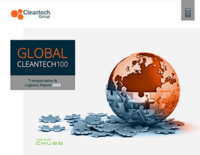Reaching Emissions Reduction Targets in Transportation: Insights from Cleantech Forum Europe
This decade will be a critical time for action to reach emissions reduction targets in the transportation sector. Scotland has set an emissions reduction target of 75% by 2030 and net zero by 2045, and the UK has set a net zero emissions target of 2050. Transportation is one of the largest contributors to those emissions, and in fact, it is the largest contributor in Scotland, making deployment and scale-up of zero-emission technologies in transportation a key focus.
At this year’s Cleantech Forum Europe, we held two sessions on net-zero emissions transportation. The first was a panel discussion on what actions need to be taken by the public sector, industry and innovation to reach net zero emissions in transportation by mid-century. The second was an innovation showcase that featured six diverse startups, from sustainable aviation fuel to micromobility.
Innovation in technology, business models and financing is needed, but scale-up is possible in some areas
Technology development has made electrifying passenger cars possible at a large scale, but emissions in other sectors, such as heavy-duty trucking, maritime shipping and aviation, will be harder to abate due to heavy batteries and range limitations. A common theme discussed by the panel was that a suite of propulsion technologies, including battery electric, hydrogen and sustainable fuels will be necessary to decarbonize the harder to abate sectors. From a technoeconomic standpoint, use cases should be matched with the fuel and powertrain to match use profile. Further, business model and financial innovation is still needed to engage the right stakeholders and fund new vehicles and infrastructure, as Sarah Petrie from Michelin Scotland Innovation Parc (MSIP) pointed out.
Considerations for corporates procuring zero-emission vehicles
Where the technology is available, scale-up needs to and can happen now. In consumer-facing markets, corporates can leverage green premiums on products (where consumers are willing to pay) to fund zero-emission vehicles. However, John Jensen from Roland Berger noted that consumers of transportation and logistics services are not willing to pay more for zero-emission transportation but are willing to wait longer, so corporates can use efficiency improvements to create bottom-line benefits to overcome the financial burden of zero-emission procurements (i.e., using fewer vehicles for the same task). Scaling up will also require a new set of competencies around zero-emission projects. For example, reaching zero-emissions for one logistics company could involve electrifying hundreds of sites, each one a unique project. Fueling and charging infrastructure will also be a key enabler of scale-up.
Role of the public sector
Two of the major roles of the public sector the panel speakers discussed were:
- De-risk technology: Feasibility studies funded by the public sector are useful instruments to understand if technologies can be de-risked from a total cost of ownership (TCO), environmental and consumer perspective.
- Create demand signals for infrastructure: Clear, long term demand signals are essential to prompt private investment into infrastructure. The public sector can do this through long-term subsidy support for zero-emission vehicles.
For example, UKRI is working on three feasibility studies that will result in the deployment of approximately 100 hydrogen trucks over the next five years to help de-risk the technology. Transport Scotland has put significant funding towards supporting electric transit bus procurement and are working with distribution network operators (DNOs) to plan and develop the accompanying electric infrastructure.
The Innovation Showcase featured:
- EH Group Engineering, developer of a compact, lightweight and efficient fuel cell stack with applications in long-distance and heavy-duty vehicles such as trucks and buses.
- Elonroad, a company developing on-road EV charging for dynamic and stationary charging.
- CityQ, a developer of enclosed electric bikes for mobility and cargo delivery as well as a smart connected technology platform.
- Arxax, a provider of an innovative hydrogen refueling business model involving strategically-placed fueling stations, contractual pricing and data-driven fuel consumption and optimization.
- Synhelion, a developer of a process that uses solar heat to convert carbon dioxide and water into sustainable fuels.
- Zenobe, a provider of a turnkey service for fleet electrification, including on-site solar generation, battery storage, smart charging, telematics and fleet management, second-life battery applications and vehicle and battery financing.



